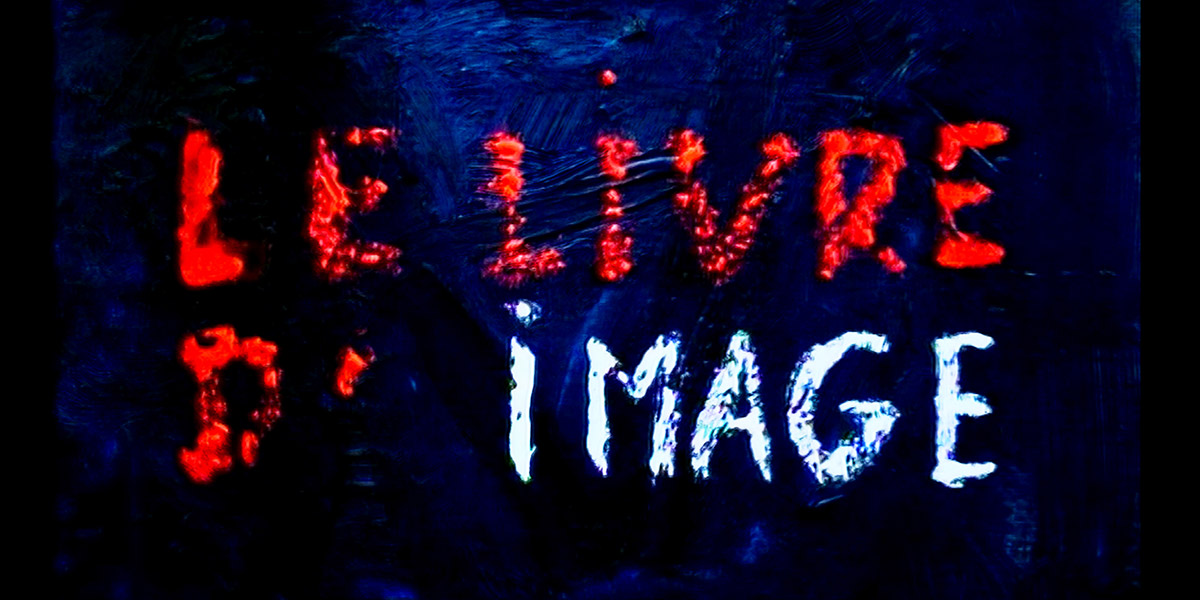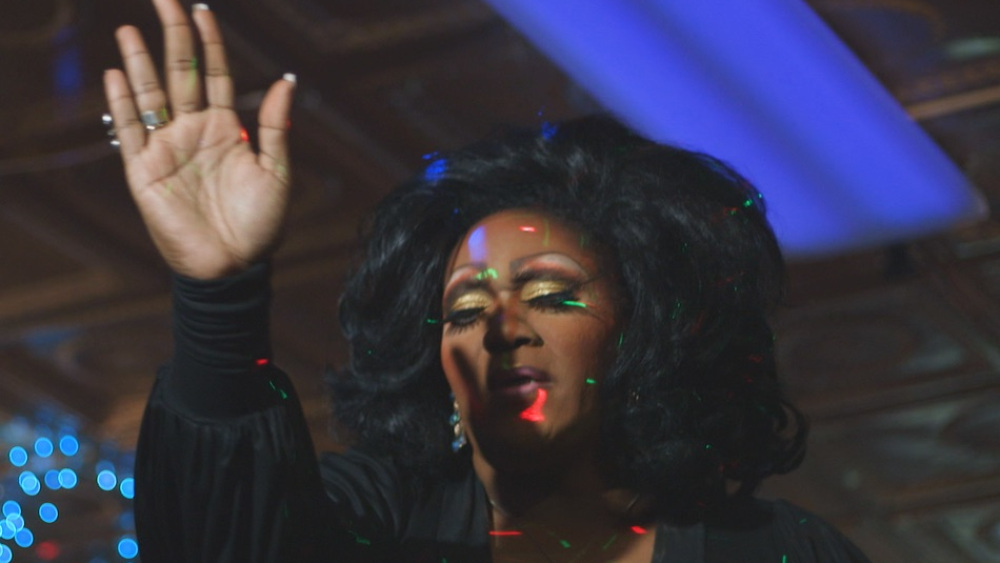Doc Corner: Fyre Festival, Jean-Luc Godard and Eureka in First-Quarter Round-Up
 Wednesday, March 13, 2019 at 1:00PM
Wednesday, March 13, 2019 at 1:00PM By Glenn Dunks
We sometimes get so carried away with Oscar and all things award season adjacent that we forget there are very real movies being released in those first couple of months of the year. After last week's very topical Leaving Neverland review, we're going to back back into January and February and pluck out a few titles we have seen: Fyre, The Image Book, and The Gospel According to Eureka.

FYRE
It's not very often that Shoah comes up in conversation at a party, but there we were when somebody asked me about Fyre, the new documentary from the director of American Movie, Chris Smith. I had said I would rather watch all nine and a half hours of Holocaust testimonials than I would watch another 90 minutes of Fyre (including the adjacent Hulu documentary Fyre Fraud that I have no endured). I may have been several margaritas down and it may come off as unnecessary flippant, and yet here I am weeks later and it is a sentiment I would stand by...
Because Fyre is a bad movie; a real soul-scorching movie without the ability to illuminate upon life in any meaningful way beyond the surface.
Fyre is a documentary so hollow in its condemnation of the disastrous Fyre Festival and its participants that there is really little reason to actually bother watching it. A documentary full of such ghastly empty-headed dimwits and vacuous, shameless morons that even the schadenfreude one may get watching their downfall can’t sustain the runtime when I felt myself dying on the inside with every passing minute. Fyre was such a dire and depressingly sad experience that I got angry for all sorts of reasons beyond the festival organizers' ill-conceived, dunderheaded plans to fleece money out of boring displays of human bankruptcy for whom the ultimate fate of attending this festival was not demoralizing enough.
And that’s before we even get to the widely-documented fact that Fyre is ethically compromised having been produced by the marketing firm hired to sell the festival to the world. Is that better or worse than Fyre Fraud’s having paid central corrupt figure Billy McFarland an estimated $250,000? I don’t know. At least Fyre is well-edited and has a knack of getting some good talking head interviews, but I genuinely can’t remember a more miserable time I have had watching a movie in quite some time. Given the subject matter, it's appropriate the Fyre is just content to be consumed, churned into memes before being forgotten because it had so little to actually say.
THE IMAGE BOOK
I would love to see Jean-Luc Godard's take on the Fyre festival, wouldn't you? The mind boggles at what he would have made of it it. This is, after all, the man who made a 3D movie with a central set-piece of a dog taking a shit in the woods. He would definitely find something perverse in it all.
 Instead we have The Image Book (Le Vivre d'image), a movie that I am not even entirely sure I should be talking about as it's not technically a documentary. Or is it? Maybe it is! Who knows. It's certainly something adjacent to a documentary. Whoever labelled it an “avant-garde horror essay film” on Wikipedia probably got the closest to alluding to its, I guess, liminal qualities. It is everything and it is nothing. It occupies a genre all to itself, probably. What that genre is, I just don’t know.
Instead we have The Image Book (Le Vivre d'image), a movie that I am not even entirely sure I should be talking about as it's not technically a documentary. Or is it? Maybe it is! Who knows. It's certainly something adjacent to a documentary. Whoever labelled it an “avant-garde horror essay film” on Wikipedia probably got the closest to alluding to its, I guess, liminal qualities. It is everything and it is nothing. It occupies a genre all to itself, probably. What that genre is, I just don’t know.
Told across five parts, Godard dives even further into the cloud of vibrant experimentalism that he occupied with his last film, the aforementioned (and extraordinary in the true definition of the word) Goodbye to Language (a comparatively straight-forward film). At various times it is a treatise on cinema, on the Arab world, on revolution, on trains. It’s an assault on sound design where many months after my initial viewing I am still unsure if there was a mistake or it was all intentional. If audiences were still open to discombobulating experiments at dingy arthouse theatres while high on drugs, The Image Book would probably play for eight months. And yet somehow The Image Book feels both at once behind and yet ahead of the times. There’s a reason the 2018 Cannes jury couldn’t get it out of their minds and awarded it a “Special Palme d’Or” for being… what it is. An ephemeral burst of Godard’s imagination exploding across the screen in crayon.
THE GOSPEL OF EUREKA
The intersection of religion and sexuality is an awkward one in The Gospel of Eureka, but not for reasons one might expect. The very idea behind the town of Eureka Springs is remarkable and yet directors Donal Mosher and Michael Palmieri (Gotham nominee and Cinema Eye winner October Country) seem determined at every turn to downplay it as if their mission was to make Eureka look as mundane as possible. This is when the real gold is in how it has survived, and even flourished, because of the juxtaposition between these two worlds, equally flamboyant one must note, that its residents reside in.
After all, Eureka Springs is a town that has a giant Jesus statue, and which stages its own re-enactment of the death and rebirth of Christ and yet is also a majorly progressive city on the front lines of queer-friendly legislation within Arkansas including being the first city in the state to issue same-sex marriage licenses and has a pride parade down its main street. Why are these two worlds portrayed as either dreary or emotionally removed? It’s (surprisingly) not helped by narration by Justin Vivian Bond that is smooth as honey, as is his want, yet feels disconnected and lacking in wit, something that carries over to the film more generally within its exploration of Eureka's queer community.

Focused predomantly around the drag scene as well as several key individuals who make Eureka Springs their home, it is also the place of Anita Bryant's failed comeback in yet another blurring between these two worlds that the film seems reluctant to dive deeper into. There’s something – irony, perhaps? satire, potentially – in the way Palmieri, acting as the film’s editor, cuts between The Great Passion Play with its robes and fake blood and the pageantry of sequins and wigs on the stage of a popular drag venue, but The Gospel of Eureka can't put its finger on it any more than it can see the potential of most of its story strands.
Release: Fyre is streaming now on Netflix, while you may still find The Image Book and The Gospel of Eureka in an arthouse touring the country or on its way to home entertainment in some form.
Oscar chances: No. None of these films are the sort to grab the doc branch's attention in recent years although I suspect you'll see them pop up at a critics organisation or two.
 Doc Corner,
Doc Corner,  Jean-Luc Godard,
Jean-Luc Godard,  LGBT,
LGBT,  Review,
Review,  documentaries
documentaries 


Reader Comments (7)
I think "The Image Book" might the first film I walked out from during a film festival. It is what it is, nothing, everything, eventually... who cares?
Actually, a lot of people do because the screening was packed. But it feels like you really need to be in a particular state of mind to experience whatever Godard is trying to communicate. And it is a horror film of sorts. It is more of an assault film: assault on the senses, on your intellectual capacity and so on.
But I only saw an hour of it. Felt angry and exhausted afterwards. Perhaps that is the point, perhaps it just doesn't matter. I choose the second option.
I love "Fyre" any movie which makes influencers looks like fools get my Oscar
i didn't hate Fyre at all. Sure there was a goldmine of social commentary that could have been gleaned from it, but the story itself is fascinating enough.
I didn't attempt The Image Book because Goodbye to Language nearly did me in...
We should talk about Documentary Now! Cate Blanchett's "Waiting for the Artist" was released last week and is amazing.
Fyre tells us nothing about influencer culture, rather it just revels in their stupidity. Those people are horrible and why would I want to watch that?
Glenn: Yeah, "Influencer culture" is...sigh. PewDiePie alone is...yikes.
But Glenn is so much fun to see these shallow influencers get what they deserve for their stupidity